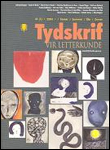De la philosophie des concours litteraires au Burkina Faso
DOI:
https://doi.org/10.4314/tvl.v41i1.29661Keywords:
academies, patrons, literary corpus, literary contest, Burkinabe literatureAbstract
As an emerging country, Burkina Faso is in a situation where writers and literary production need the State's support to build up a worthwhile body of literature. To understand the role accorded to the State, we must go back in time and analyse the roles played by academies and patrons in the promotion of French literature. According to researchers, the literature of France owes its national and international influence not only to those who produced literature, but also to institutions and individuals who committed themselves to specific actions. These were the academies and patrons, each of whom concentrated on a specific area: while the academies contributed to socialize, train, acknowledge, and publicize writers, patrons gave them glory and financial reward. In Burkina Faso, it is the State, through its cultural organs, which has replaced private, individual and/or collective initiatives by contributing to the establishment of the literary corpus. The State's policy revolves around organizing literary competitions whose guiding principles are the encouragement of creators, creative freedom and the promotion of the major literary genres and award-winning writers through media coverage and publication of their works. To implement its policy, the State has instituted two competitions: the National Arts and Letters Award (Grand Prix national des Arts et des Lettres - G.P.N.A.L.) and the President's Literary Award (Grand Prix litteraire du President du Faso - G.P.L.P.F.). The first was awarded for the 12th time in 2002 with 1008 manuscripts entered. Since 1998, the number of participants has been steadily increasing. The main reasons for this are the increases in the cash prizes awarded and the publication opportunities offered to award winners. Manuscripts accepted for this award may be in French or in any of the three national languages (Moore, Dioula and Fulani). Created only in 1994, the G.P.L.P.F. is a recent literary competition, having been awarded only three times so far. The prizes it awards are higher than those of the G.P.N.A.L., both in cash and in kind. However, it only concerns novels. The growing Burkinabe literary corpus has thus benefited from the valuable support of the State, through the literary competitions organized by the national cultural organs.
Downloads
References
...
Downloads
Published
Issue
Section
License
Copyright (c) 2003 Tydskrif vir Letterkunde

This work is licensed under a Creative Commons Attribution-ShareAlike 4.0 International License.


 https://orcid.org/0000-0001-6465-6584
https://orcid.org/0000-0001-6465-6584


.png)